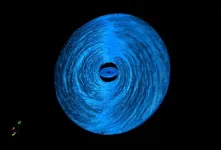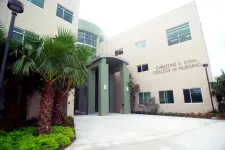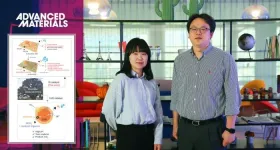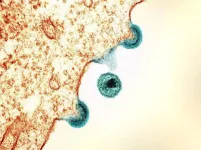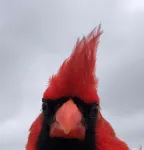(Press-News.org) Highlights:
Organisms, including viruses, live in the deepest, darkest places on the planet
Marine virologists analyzed sediment from the Mariana Trench, the deepest place on Earth, and identified a new bacteriophage
The phage infects Halomonas bacteria, which have been found in deep-sea environments and near hydrothermal vents
The study helps probe how phages and hosts evolve together in secluded, hostile environments
Washington, D.C. — The Mariana Trench, the deepest place on Earth, plunges nearly 11,000 meters at its lowest point on the floor of the Pacific Ocean. Life persists in the deep and cold darkness, and “wherever there’s life, you can bet there are regulators at work,” said marine virologist Min Wang, Ph.D, at the Ocean University of China, in Qingdao. “Viruses, in this case.”
This week in Microbiology Spectrum, Wang and an international group of researchers report the discovery of a new virus isolated from sediment brought up from a depth of 8,900 meters. The virus is a bacteriophage, or a virus that infects and replicates inside bacteria, and bacteriophages are believed to be the most abundant life forms on the planet. “To our best knowledge, this is the deepest known isolated phage in the global ocean,” said Wang.
The newly found phage infects bacteria in the phylum Halomonas, which are often found in sediments from the deep seas and from hydrothermal vents, geyser-like openings on the seafloor that release streams of heated water. Wang said the group’s analysis of the viral genetic material points to existence of a previously unknown viral family in the deep ocean, as well as new insights into the diversity, evolution and genomic features of deep-sea phages and phage-host interactions.
In previous work, the researchers have used metagenomic analysis to study viruses that infect bacteria in the order Oceanospirallales, which includes Halomonas. For the new study, Wang’s team looked for viruses in bacterial strains collected and isolated by a team led by marine virologist Yu-Zhong Zhang, Ph.D, also at the Ocean University of China, in Qingdao. Zhang’s research explores microbial life in extreme environments, including polar regions and the Mariana Trench.
The genomic analysis of the new virus, identified as vB_HmeY_H4907, suggests that it is distributed widely in the ocean and has a similar structure to its host. Wang said the study points to new questions and research areas focused on the survival strategies of viruses in harsh, secluded environments—and how they co-evolve with their hosts. The new virus is lysogenic, which means it invades and replicates inside its host, but usually without killing the bacterial cell. As the cell divides, the viral genetic material is also copied and passed on.
In future studies, Wang said, the group plans to investigate the molecular machinery that drives interactions between deep-sea viruses and their hosts. They’re also searching for other new viruses in extreme places, “which would contribute to broadening our comprehension of the virosphere,” Wang said. “Extreme environments offer optimal prospects for unearthing novel viruses.”
###
The American Society for Microbiology is one of the largest professional societies dedicated to the life sciences and is composed of 30,000 scientists and health practitioners. ASM's mission is to promote and advance the microbial sciences.
ASM advances the microbial sciences through conferences, publications, certifications, educational opportunities and advocacy efforts. It enhances laboratory capacity around the globe through training and resources. It provides a network for scientists in academia, industry and clinical settings. Additionally, ASM promotes a deeper understanding of the microbial sciences to diverse audiences.
END
A newly identified virus emerges from the deep
2023-09-20
ELSE PRESS RELEASES FROM THIS DATE:
Black holes eat faster than previously expected
2023-09-20
A new Northwestern University-led study is changing the way astrophysicists understand the eating habits of supermassive black holes.
While previous researchers have hypothesized that black holes eat slowly, new simulations indicate that black holes scarf food much faster than conventional understanding suggests.
The study will be published on Wednesday (Sept. 20) in The Astrophysical Journal.
According to new high-resolution 3D simulations, spinning black holes twist up the surrounding space-time, ultimately ripping apart ...
FAU receives $1.3 million grant for Alzheimer’s outreach in Broward County
2023-09-20
Florida Atlantic University’s María de los Ángeles Ortega, DNP, APRN, in the Christine E. Lynn College of Nursing, has been awarded a three-year, $1.3 million grant from the Administration for Community Living’s (ACL) Alzheimer’s Disease Program Initiative for a groundbreaking project designed to advance health equity and improve quality of life for individuals living with or at high risk for Alzheimer’s disease and related dementias (ADRD) and their family caregivers.
ACL was created around the fundamental principle that all people, regardless of age or disability, should be able to live independently ...
New Si-based photocatalyst enables efficient solar-driven hydrogen production and biomass refinery
2023-09-20
A team of researchers, led by Professor Jungki Ryu in the School of Energy and Chemical Engineering at UNIST and Professor Soojin Park from Pohang University of Science and Technology (POSTECH), have achieved a significant breakthrough in the development of a hybrid silicon photocatalyst. This innovative catalyst utilizes solar power to produce hydrogen and high-value compounds efficiently, marking a major step forward in green hydrogen production technology.
The newly developed photocatalyst is both non-toxic and eco-friendly, addressing the limitations associated with ...
Chameleon-inspired coating could cool and warm buildings through the seasons
2023-09-20
As summer turns to fall, many people will be turning off the air conditioning and firing up heaters instead. But traditional heating and cooling systems are energy intensive, and because they typically run on fossil fuels, they aren’t sustainable. Now, by mimicking a desert-dwelling chameleon, a team reporting in ACS’ Nano Letters has developed an energy-efficient, cost-effective coating. The material could keep buildings cool in the summers — or warm in the winters — without additional energy.
Many ...
Effective visual communication of climate change
2023-09-20
Boulder, Colo., USA: The consequences of a warming climate frequently dominated the news this summer, from devastating wildfires and floods to deadly heat waves across the globe. Reducing harm from climate change is a challenging endeavor, and it requires comprehensive public education. Thus, the question arises: How can climate change science be made most accessible to the general population, as well as decision-makers and educators?
In a new paper published in the journal Geosphere, Steph Courtney and Karen McNeal explore the effects ...
Clinical trial of HIV vaccine begins in United States and South Africa
2023-09-20
WHAT:
A trial of a preventive HIV vaccine candidate has begun enrollment in the United States and South Africa. The Phase 1 trial will evaluate a novel vaccine known as VIR-1388 for its safety and ability to induce an HIV-specific immune response in people. The National Institute of Allergy and Infectious Diseases (NIAID), part of the National Institutes of Health, has provided scientific and financial support throughout the lifecycle of this HIV vaccine concept and is contributing funding for this study.
VIR-1388 is designed to instruct the ...
Five new health systems partner with American Thoracic Society on vaccine initiative
2023-09-20
NEW YORK, NY – Sept. 20, 2023 – As cities brace for a confluence of flu, COVID-19, pneumonia, and RSV infections this fall, the American Thoracic Society announced that five new health systems have partnered with the Society to improve vaccination rates. Grady Health System (Atlanta, GA), Meharry Medical College (Nashville, TN), St. Luke’s Health System (Boise, ID), the University of Colorado (Aurora, CO), and Wayne Health (Detroit, MI) join the University of Arizona/ Banner Health, West Virginia University Hospitals, Inc., and San Francisco Health Network/ University of California to help identify barriers to vaccination and find ...
Mount Sinai receives $6.2 million grant from the Steven & Alexandra Cohen Foundation for the clinical care of long Lyme disease
2023-09-20
Mount Sinai’s Department of Rehabilitation and Human Performance has announced a $6.2 million grant from the Steven & Alexandra Cohen Foundation. The grant will expand the Cohen Center for Recovery From Complex Chronic Illnesses (CoRE) to encompass research and clinical care beyond long COVID to include “long Lyme Disease/Lyme+” as well as other infection-associated complex chronic illnesses.
This funding will be used for new research programs focusing on understanding and highlighting the key similarities and differences between long COVID; long Lyme disease/Lyme+, a collection of infection-associated ...
Citizen Science receives a significant boost
2023-09-20
There is a growing interest in incorporating assistance from private citizens into scientific projects globally. Nonetheless, it seems that Anders P. Tøttrup, an Associate Professor at the Natural History Museum of Denmark, might become the world's first professor in Citizen Science.
Anders P. Tøttrup is a trained biologist and leads the section for Citizen Science projects at the Natural History Museum of Denmark. These projects involve scientific endeavours in which citizens are invited to assist in collecting and analyzing data. Now, the Museum is taking a step further as Anders P. Tøttrup enters a 'professor track.' The goal is ...
Urban light pollution linked to smaller eyes in birds
2023-09-20
PULLMAN, Wash. – The bright lights of big cities could be causing an evolutionary adaptation for smaller eyes in some birds, a new study indicates.
Researchers found that two common songbirds, the Northern Cardinal and Carolina Wren, that live year-round in the urban core of San Antonio, Texas, had eyes about 5% smaller than members of the same species from the less bright outskirts. Researchers found no eye-size difference for two species of migratory birds, the Painted Bunting and White-eyed Vireo, no matter which part of the city ...
